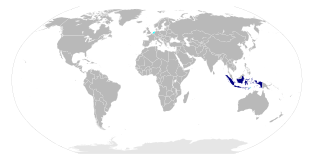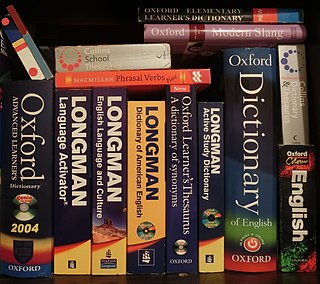
In linguistics, cognates, also called lexical cognates, are words that have a common etymological origin. Cognates are often inherited from a shared parent language, but they may also involve borrowings from some other language. For example, the English words dish and desk and the German word Tisch ("table") are cognates because they all come from Latin discus, which relates to their flat surfaces. Cognates may have evolved similar, different or even opposite meanings, but in most cases there are some similar sounds or letters in the words, in some cases appearing to be dissimilar. Some words sound similar, but do not come from the same root; these are called false cognates, while some are truly cognate but differ in meaning; these are called false friends.

Indonesian is the official language of Indonesia. It is a standardised variety of Malay, an Austronesian language that has been used as a lingua franca in the multilingual Indonesian archipelago for centuries. Indonesia is the fourth most populous nation in the world—of which the majority speak Indonesian, which makes it one of the most widely spoken languages in the world.

A noun is a word that functions as the name of a specific object or set of objects, such as living creatures, places, actions, qualities, states of existence, or ideas. However, noun is not a semantic category, so that it cannot be characterized in terms of its meaning. Thus, actions and states of existence can also be expressed by verbs, qualities by adjectives, and places by adverbs. Linguistically, a noun is a member of a large, open part of speech whose members can occur as the main word in the subject of a clause, the object of a verb, or the object of a preposition.

An adverb is a word or an expression that modifies a verb, adjective, determiner, clause, preposition, or sentence. Adverbs typically express manner, place, time, frequency, degree, level of certainty, etc., answering questions such as how?, in what way?, when?, where?, and to what extent?. This is called the adverbial function, and may be performed by single words (adverbs) or by multi-word adverbial phrases and adverbial clauses.
In traditional grammar, a part of speech is a category of words that have similar grammatical properties. Words that are assigned to the same part of speech generally display similar syntactic behavior—they play similar roles within the grammatical structure of sentences—and sometimes similar morphology in that they undergo inflection for similar properties.
A loanword is a word adopted from one language and incorporated into another language without translation. This is in contrast to cognates, which are words in two or more languages that are similar because they share an etymological origin, and calques, which involve translation.
In linguistics, a calque or loan translation is a word or phrase borrowed from another language by literal word-for-word or root-for-root translation. When used as a verb, "to calque" means to borrow a word or phrase from another language while translating its components, so as to create a new lexeme in the target language.
In linguistics, function words are words that have little lexical meaning or have ambiguous meaning and express grammatical relationships among other words within a sentence, or specify the attitude or mood of the speaker. They signal the structural relationships that words have to one another and are the glue that holds sentences together. Thus they form important elements in the structures of sentences.

Prepositions and postpositions, together called adpositions, are a class of words used to express spatial or temporal relations or mark various semantic roles.
In linguistics, a compound is a lexeme that consists of more than one stem. Compounding, composition or nominal composition is the process of word formation that creates compound lexemes. That is, in familiar terms, compounding occurs when two or more words or signs are joined to make one longer word or sign. The meaning of the compound may be similar to or different from the meaning of its components in isolation. The component stems of a compound may be of the same part of speech—as in the case of the English word footpath, composed of the two nouns foot and path—or they may belong to different parts of speech, as in the case of the English word blackbird, composed of the adjective black and the noun bird. With very few exceptions, English compound words are stressed on their first component stem.
Gairaigo is Japanese for "loan word" or "borrowed word", and indicates a transliteration into Japanese. In particular, the word usually refers to a Japanese word of foreign origin that was not borrowed in ancient times from Old or Middle Chinese, but in modern times, primarily from English or other European languages. These are primarily written in the katakana phonetic script, with a few older terms written in Chinese characters (kanji); the latter are known as ateji.
modal verb is a type of verb that is used to indicate modality – that is: likelihood, ability, permission, request, capacity, suggestions, order, obligation, or advice. Modal verbs always accompany the base (infinitive) form of another verb having semantic content. In English, the modal verbs commonly used are can, could, may, might, must, will, would, shall, should, ought to, had better, have to and sometimes need or dare. In English and other Germanic languages, modal verbs are often distinguished as a class based on certain grammatical properties.

A forlorn hope is a band of soldiers or other combatants chosen to take the vanguard in a military operation, such as a suicidal assault through the kill zone of a defended position, where the risk of casualties is high.
An ambitransitive verb is a verb that is both intransitive and transitive. This verb may or may not require a direct object. English has many ambitransitive verbs. Examples include read, break, and understand.

-ing is a suffix used to make one of the inflected forms of English verbs. This verb form is used as a present participle, as a gerund, and sometimes as an independent noun or adjective. The suffix is also found in certain words like morning and ceiling, and in names such as Browning.
A separable verb is a verb that is composed of a lexical core and a separable particle. In some sentence positions, the core verb and the particle appear in one word, whilst in others the core verb and the particle are separated. The particle cannot be accurately referred to as a prefix because it can be separated from the core verb. German, Dutch, Afrikaans and Hungarian are notable for having many separable verbs. Separable verbs challenge theories of sentence structure because when they are separated, it is not evident how the compositionality of meaning should be understood.

In linguistic morphology, inflection is a process of word formation, in which a word is modified to express different grammatical categories such as tense, case, voice, aspect, person, number, gender, mood, animacy, and definiteness. The inflection of verbs is called conjugation, and one can refer to the inflection of nouns, adjectives, adverbs, pronouns, determiners, participles, prepositions and postpositions, numerals, articles etc., as declension.
In linguistics an accidental gap, also known as a gap, accidental lexical gap, lexical gap, lacuna, or hole in the pattern, is a word or other form that does not exist in some language but which would be permitted by the grammatical rules of the language. Accidental gaps differ from systematic gaps, those words or other forms which do not exist in a language due to the boundaries set by phonological, morphological, and other rules of that specific language.

In English traditional grammar, a phrasal verb is the combination of two or three words from different grammatical categories — a verb and a particle, such as an adverb or a preposition — to form a single semantic unit on a lexical or syntactic level. Examples: turn down, run into, sit up. There are tens of thousands of them, and they are in everyday, constant use. These semantic units cannot be understood based upon the meanings of the individual parts alone, but must be taken as a whole. In other words, the meaning is non-compositional and thus unpredictable. Phrasal verbs that include a preposition are known as prepositional verbs and phrasal verbs that include a particle are also known as particle verbs. Additional alternative terms for phrasal verb are compound verb, verb-adverb combination, verb-particle construction, two-part word/verb or three-part word/verb and multi-word verb.





